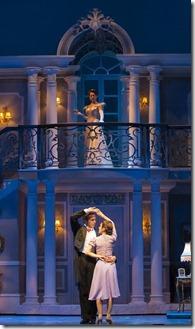
The Sound of Music
By Richard Rodgers, Oscar Hammerstein II,
Howard Lindsay and Russel Crouse
Directed by Marc Bruni
at Civic Opera House, 20 N. Wacker (map)
thru May 25 | tickets: $29-$199 | more info
Check for half-price tickets
Read review
The grandest Sound of Music you’re likely ever to see
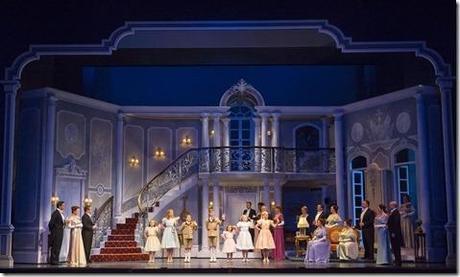
Lyric Opera of Chicago presents
The Sound of Music
Review by John Olson
Though they are mostly born in Broadway theaters of roughly 1000-2000 seats, musicals are done in all sorts of places and all sorts of ways. Touring companies play former huge vaudeville houses or movie palaces, storefront theaters do them in tiny spaces, concert versions are performed in symphony halls or amphitheaters, and with Lyric’s American Musical Theatre Initiative, some are done in the grand Civic Opera House. The great thing about this variety is there’s no right answer for the best way to do a musical. Sometimes the intimacy of a smaller space helps the audience better connect with the characters, sometimes a concert staging’s huge orchestra gives the score new power, or a large theater makes possible a spectacle equaling or exceeding Broadway production values. That said, The Sound of Music doesn’t seem to cry out for the sort of mammoth production that’s possible in Chicago’s Opera House. The piece doesn’t require much of a chorus, there’s not a lot of
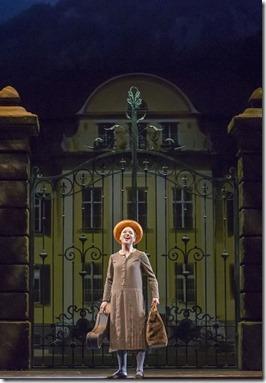
Following the quiet “Preludium,” sung a cappella by the nuns of the Abbey, a huge painted backdrop of Maria’s mountain is revealed, complete with a hidden ramp to serve as a trail she travels from the flies down to the stage as if descending the mountain, singing the title song with accompaniment by the soundtrack-sized 39-piece Lyric Opera Orchestra. It’s not the aerial arc shot that opens the movie, but it comes closer to it than anything else we’re likely to ever see in a stage Sound of Music. Maria’s journey from the Abbey to the von Trapp estate mimics the film as well – using the song “I Have Confidence” Rodgers wrote for the movie and re-enacting key shots from that sequence of the film. In Michael Yeargan’s set design, the mansion inside and out resembles that of the movie, and when Maria and the kids venture out of the house and into the town singing “Do Re Mi”, they travel on bicycles just like in the film.
It seems no expense has been spared – with gorgeous costumes by Alejo Vietti, beautiful lighting by Duane Schuler and sound design by Mark Grey that seems natural yet keeps every syllable of every lyric crystal-clear. The cast, assembled from Broadway, Hollywood, the opera world and Chicago’s musical theater community, is perfect for every role.
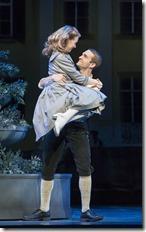
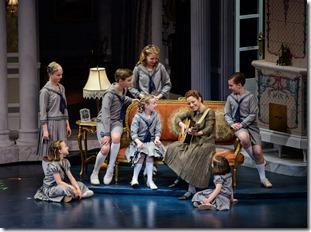
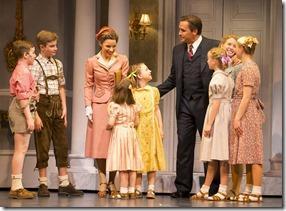
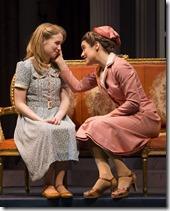
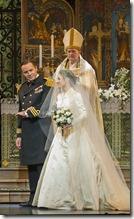
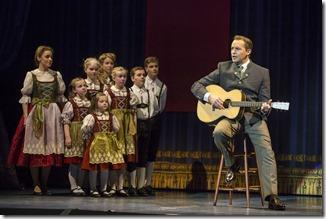
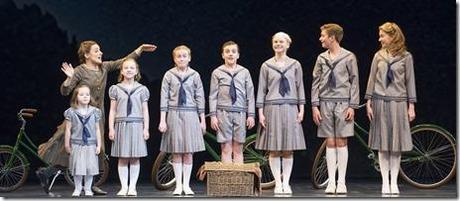
For Maria, Bruni has cast Broadway’s Jenn Gambatese (from All Shook Up and Tarzan), and she brings a refreshing and new take on the girl. Her Maria, though a bit 21st Century and American for a small town Austrian girl of the 1930’s, has the spunkiness and irreverence the lyrics and text call for but which has rarely been played by other actresses in this role. For once we see the spirit that would have chafed at the structured life of the Abbey, and that would have had the guts to stand up to the Captain. Gambatese has a lovely soprano that perfectly suits the role, and she makes a truly lovable Maria. Her Captain, Billy Zane, is not known for his singing (though he played Billy Flynn in Chicago on Broadway for a few months in 2002-2003), but he handles the Captain’s vocals quite nicely, albeit by singing in short phrases, offering space for frequent breaths, and he has the presence to play the strong willed naval officer that is his character. For the Mother Abbess, we see a true diva in opera’s Christine Brewer, who sings a “Climb Every Mountain” that surely climbs across the sea of main floor aisles and up to the remote reaches of the balconies. Also from the Opera community is Elizabeth Futral, who, with an operatic voice that suits musical comedy, makes a classy Elsa Schraeder. She has great fun with “How Can Love Survive” and “No Way to Stop It,” two songs from the Broadway original that were not in the film. Her comic counterpart, Max Detweiler, is nicely played by Edward Hibbert – a noted character actor from Broadway, Hollywood and TV. There’s good work as well by Dev Kennedy and Mary Ernster as the butler and housekeeper.
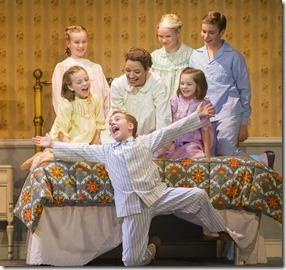
To be fair to Mr. Sorrow, with the exception of Ms. Gambatese, this cast is not big on nuance. Bruni directs the actors to play broadly and comically and, in truth, that may be the smartest choice to make in a 3,500 seat hall. The emphasis here is on the spectacle, and of course the music – both elements that are right in the wheel house of an opera company. Nuance and subtlety might not read across the sea of aisles on the main floor or up in the balconies. But as much as The Sound of Music is known for its sentiment, there’s real heart and stakes in it. I’m always surprised at the way it punches even my jaded buttons. Here though, with the lines played for big laughs, it’s tougher to connect with the characters and share their fears and sacrifices as they flee the Nazi tyrants who have just overtaken their homeland.
A more intimate production would make it easier to engage with the characters. A film can put spectacle on the screen but, through close-ups, still bring us close to the characters. Robert Wise’s film of The Sound of Music did both and that may be the secret of its success. Lyric’s Sound of Music gives us movie-sized spectacle in a live performance and for that, many lovers of the musical in its film and stage versions will find it a must-see. At a top price of $199.00 (though ticket prices start at $29), less compulsive and completist fans of the musical may be okay waiting for another production like the well-reviewed staging at Drury Lane two years ago. Or at least looking for a discount ticket.
Rating: ★★★½
The Sound of Music continues through May 25th at Civic Opera House, 20 N. Wacker (map), with 7pm performances on Tuesdays, Fridays and Saturdays; 1:30pm matinees on Saturdays and Sundays, as well as other select days throughout the run. Tickets are $29-$199, and are available by phone (312-322-2244) or online through their website (check for half-price tickets at Goldstar.com). More information at LyricOpera.org/SoundOfMusic. (Running time: 2 hours 45 minutes, includes an intermission)
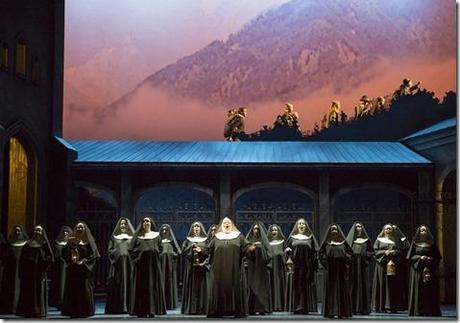
Photos by Robert Kusel and Todd Rosenberg
artists
cast
Billy Zane (Captain von Trapp), Jenn Gambatese (Maria), Edward Hibbert (Max Detweiler), Christine Brewer (Mother Abbess), Elizabeth Futral (Elsa Schraeder), Betsy Farrar (Liesl), Brady Tutton, (Friedrich), Julia Schweizer (Louisa), Michael Harp (Kurt), Isabelle Roberts (Brigitta), Kylee Hennes (Marta), Nicole Scimeca (Gretl), Zach Sorrow (Rolf), Erin Elizabeth Smith (Sister Berthe, ensemble), Cory Goodrich (Sister Margaretta, ensemble), Susan Moniz (Sister Sophia), Dev Kennedy (Franz), Mary Ernster (Frau Schmidt), Laurie Vassali (Ursula, ensemble), Hoss Brock (Baron Elberfeld, ensemble), Rob Hunt (Herr Zeller, ensemble), Elena Batman (Frau Zeller, ensemble), Kimberly McCord (Baroness Elberfeld, ensemble), Tiffany Herlein (a new postulant, ensemble), Michael Weber (Admiral von Schreiber, ensemble), Elisa Billey Becker, Cathy Dunn, Stephani Kowallis, Rosalind Lee, Kaileen Miller, Erin Murphy, Yvette Smith, Carolyn Stein, Maia Surace, Sheryl Veal, Corinne Wallace-Crane, Pamela Williams, Michelle Wrighte, Zack Colonna, Bernie Yvom (ensemble), Sharon Garvey Cohen, Amy Anderson de Jong, Colleen Fee, William Anderson, Tessa Newman, Michael Semanic, Sophia Varones, Marieclaire Popernik, Violet Hicks (understudies)
behind the scenes
Marc Bruni (director), Rob Fisher (musical director), Michael Yeargan (set designer), Alejo Vietti (costume designer), Duane Schuler (lighting designer), Mark Grey (sound designer), Denis Jones (choreographer), Michael Black (chorus master), Sarah Hatten (wigmaster and makeup designer), Rob Fisher (conductor), Jill Malmsey Sager (English diction and dialect coach), Tara Faircloith (assistant director), Peggy Stenger (stage manager), Rachel C. Henneberry, Amy Thompson, Rachel A. Tobias (assistant stage managers), Lilly West (sound engineer), Valerie Maze, William C. Billingham, Jerad Mosbey (musical preparation), Todd Rosenberg and Robert Kusel (photos)
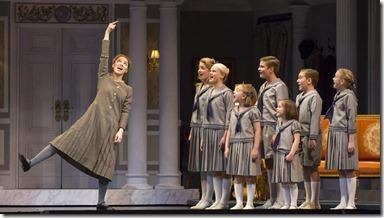
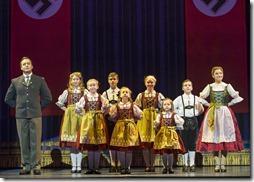
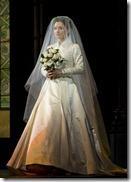
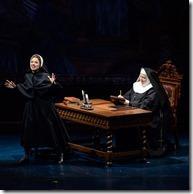
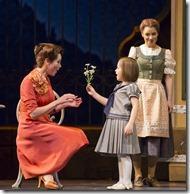
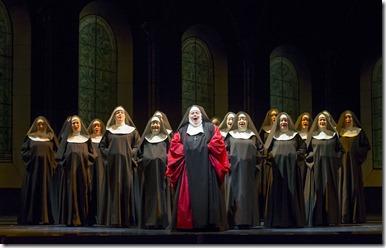
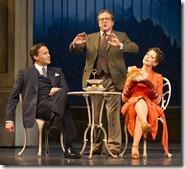
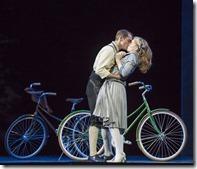
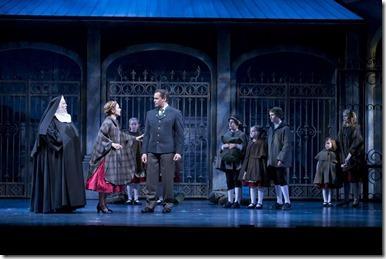
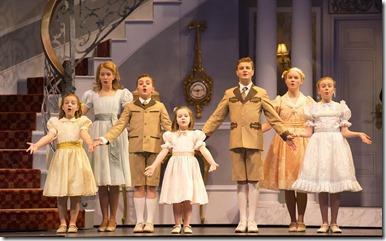
14-0454

